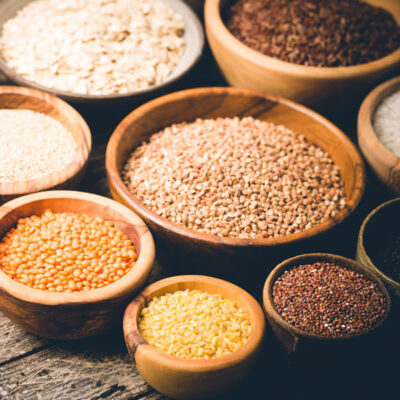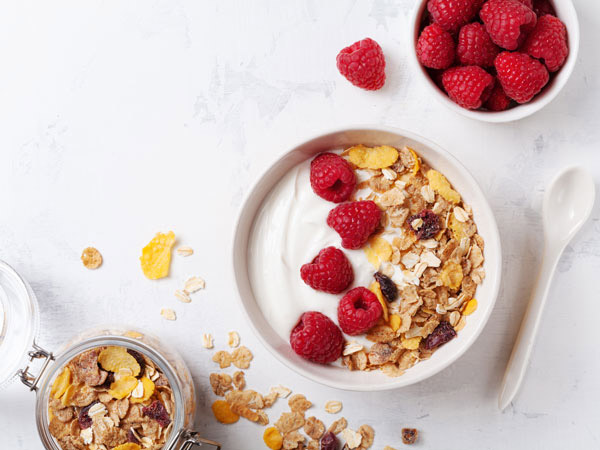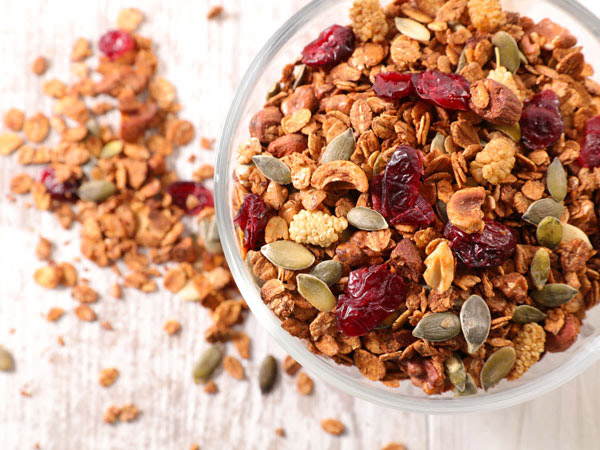What is a Healthy Breakfast?
Author: admin Date Posted:29 December 2021
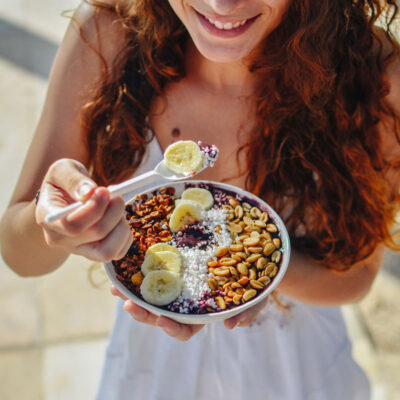
Why some breakfast cereals are healthier and how to choose. The basics of a healthy breakfast.
In this article we cover all the breakfast basics, beginning with the many benefits of eating breakfast. We explore the foods that make up a healthy breakfast and look at why some breakfast cereals are healthier than others.
TABLE OF CONTENTS
Why is breakfast important?
What is a healthy breakfast?
A balanced breakfast
Wholegrains for breakfast
Fruit for breakfast
Dairy for breakfast
Healthy breakfast cereal
Is muesli healthy?
Is granola healthy?
Is porridge healthy?
A healthy oat breakfast
Gluten-free cereal
Choose low-sugar cereal
How to build a healthy breakfast
Why is breakfast important?
Eating breakfast restores energy levels
After 8 hours without food, if you don't eat breakfast you will be running on empty all day. Chances are you will try to make up the losses with caffeine and then reach for the sugar by 11am.
A healthy breakfast replenishes nutrient levels
Food is more than a simple energy equation and the body requires a balance of nutrients to help it work efficiently and effectively. It makes sense to get the day off to the best start possible, with a broad range of nutrients.
A balanced breakfast can help you achieve your 5 a day
Breakfast is the ideal opportunity to get a head start on your 5 a day, and is a great time to get some fruit on board. Lunch and dinner may well be more vegetable based, so a few portions of fruit in the morning is a great idea.
Eating breakfast helps to regulate hunger
Eating a healthy breakfast gives us the energy, and the nutrients, to see us through to lunch. Not only do we need slow release energy to prevent those energy slumps, but quite often when we feel hunger it is because we lack certain nutrients.
A healthy breakfast provides fibre
We need at least 30g of fibre each day and eating wholegrains at breakfast is a good way to get ahead of the game. Eating fibre first thing not only keeps us feeling full but also aids digestion. A sluggish bowel can leave us feeling tired and uncomfortable, but a healthy digestive system won't slow us down.
Eating breakfast can sharpen focus and increase mental performance
Hunger is not only a distraction in itself, but the brain needs nutrients to perform well. The brain requires a constant steady supply of glucose, as well as B vitamins and fatty acids.
Breakfast boosts metabolism
We have all heard the phrase 'kick-start your metabolism' and eating breakfast does just that. Eating boosts the metabolism. Eating breakfast gets the metabolism going at the start of your day, for efficient calorie burning throughout the day.
Metabolism is the term used to define chemical reactions within the body. In nutrition, metabolism is the conversion of food into energy and the breaking down of nutrients. In lay terms we tend to use it to refer to how efficiently we are burning calories. Or in even simpler terms; how easily we gain, or lose, weight.
Our basal metabolic rate (BMR) is the number of calories that we burn at rest. Determined largely by genetics, underlying health issues, and body composition, we can however give nature a helping hand. Exercise, indeed any form of movement, is one. Eating, is another. Which is why we are doing ourselves no favours by skipping breakfast.
A balanced breakfast can help to stabilise blood sugars
A slow release of energy regulates insulin production and keeps blood sugar levels steady. Not only is this vital for overall, long-term health, but it prevents the exhausting cycle of highs and crashes that comes when we rely on instantly gratifying sources of energy such as refined carbohydrates.
Eating a healthy breakfast reinforces positive feedback
If you feel good in yourself physically and mentally, then you are likely to make positive healthy choices. Making healthy choices will help you to feel good. And round it goes. That's a positive feedback loop. It creates its own momentum.
Those who eat breakfast have better weight control
Weight control is tied in with all of these things. With better control over our metabolic processes we have a greater chance of reaching, and maintaining our healthy body weight.
What is a healthy breakfast?
Breakfast is a matter of personal choice that is likely to mean different things to different people, according to the dictates of a varying routine. The breakfast we eat on a work or school day may be totally different to a weekend breakfast. Most of us tend to eat the same thing for breakfast, especially on the days when we need to be up and at it. Which is fine; routine may be the thing that stands between breakfast or no breakfast all.
Nutritional science agrees on two things. What makes a healthy breakfast, and what doesn't.
What we don't want for breakfast is sugar, and other refined carbs, or excessive saturated fats and salt. So that's the traditional breakfast proteins best kept to a bare minimum, as well as the other side of the coin, which is sugary breakfast cereals or white toast. Basically, all the stuff we have breakfasted upon for years.
Yet these are the extremes. Fatty salty proteins and really carby carbs.
In the middle, lies some excellent food choices. Wholesome, nutritious food. Not all carbs are inherently evil, just as not all protein is a heart attack waiting to happen. The thing that we seek is...balance.
A balanced breakfast
It stands to reason that a balanced breakfast, just like a balanced diet, takes into account ALL of the food groups. The five food groups are...
Starchy foods - for energy
Fruit and veg - plenty of vitamins, minerals, and phytochemicals
Dairy - a good source of calcium
Protein - for growth and repair
Fats - provide essential fatty acids
Within these groups, some foods support a healthy lifestyle more than others. Eaten in moderation, no food is bad, yet sensible choices are the cornerstone of healthy eating. As a general rule of thumb, stick to foods as close to their natural state as possible as these have a greater chance of having their nutritional profile intact.
Nutritionists consistently recommend that a balanced breakfast consists of...
- A serving of wholegrains
- A portion or two of fruit
- A portion of dairy
That's roughly 30g wholegrains, 150g fruit, and 100g of yoghurt or 250g milk.
Additional fats and proteins can be added according to your needs and your daily diet as a whole. Nuts and seeds are all excellent sources of protein and fat.
From a breakfast viewpoint, this group of foods makes perfect sense. Grains, fruit, and dairy, with a handful of nuts and seeds thrown in. It is almost as if they evolved with breakfast in mind. They involve minimal prep, are quick to eat, and easy to digest. Not to mention nutrient dense.
Wholegrains for breakfast
We don't seem to be able to grasp the fact that grains are good for us. When it comes to nutrition, grains have become a contentious topic. They involve carbohydrate. And gluten. And then there's the question of phytic acid. We may have finally twigged that over consumption of refined grains has led to a whole host of health issues, yet unrefined grains are a different story. An important part of a healthy balanced diet, grains are not something we should dismiss lightly. They do, after all, constitute an entire food group.
Grains are the seeds of grasses known collectively as cereals. Rice, wheat, and sorghum are all examples. Oats, barley, rye, and bulghur are also cereals and Buckwheat, quinoa and millet are examples of pseudo-cereals; they are seeds but not of cereal grasses. Wholegrains are less refined and have more of their natural structure intact, with less of the nutrients removed.
The benefits of wholegrains
Not only are grains a comparatively low-cost food, providing bulk to our diet, but they also come with a range of health benefits too. They have been shown to lower the risk of heart attack and stroke. They also help to regulate blood sugar levels. Unrefined, they are an important source of fibre; a vital nutrient for digestive health.
Fibre slows down the release of sugars into the blood stream. Which is why refined grains have the opposite effect and have given carbohydrates a bad name. Refined grains have had all, or most, of their fibre removed, and a lot of their proteins and fats too, so release their sugars far too quickly. This results in insulin spikes, and also storage of excess sugars as body fat. Fibre also encourages digestive transit, which helps us digest food more efficiently and eliminate waste.
Soluble fibre, like that found in oats, also helps to stabilise blood sugar.
What about gluten-free grains?
Not all grains contain gluten. There are several gluten-free grains, including rice and sorghum. Buckwheat and quinoa may not be true grains, but they are gluten-free and can happily take the place of other, gluten-containing, grains.
Fruit for breakfast
Fruit, believe it or not, also gets a bad press. We have become so enamoured of the idea that sugar is bad for us, that we have become afraid of fruit. Yet fruit has powerful nutrients found in no other foods on Earth. As with the carbohydrate content of wholegrains, the importance lies in the whole package. Some of the most nutrient dense foods to be found are fruit. Not only do they come with fibre (sometimes soluble - as in apples) that slows down the absorption of sugar but also a whole array of vitamins and phytochemicals.
Breakfast is the ideal opportunity for eating fruit. As part of a balanced meal, alongside the fibre from the grains, plus the fats and protein from dairy as well as nuts and seeds, the sugars in fruit are taken into the body even more slowly. Fruit is sweet and easy to eat. A form of easily digestible nutrients after the nightly period of fasting.
Dairy for breakfast
And then there is dairy. Much maligned and misunderstood. So much so that it is another entire food group disappearing from our diet. We understand that there are a number of good reasons that you may not want dairy as part of your diet. We are not here to debate, or to judge. However, the nutrient value of dairy foods such as milk and yoghurt cannot be denied.
Milk is a natural partner for breakfast cereal. Just as yoghurt is a natural partner for fruit. A trio of nutritious foods with which to begin the day.
250g milk contains 8g protein. That is around one-fifth of the daily needs for a female and provides all of the essential amino acids. Whey protein in particular is rich in branched-chain amino acids which is why they make protein powder from whey. Speaking of whey, milk is 88% water so it is hydrating as well as nutritious.
25og full-fat milk contains 8g fat and is a complex mix of hundreds of fatty acids.
Milk is high in Vitamin B12, and is one of the best sources of Vitamin B2. It is the best source of easily absorbable calcium and is usually fortified with Vitamin D.
Yoghurt, made from fermented milk, has the same nutrient profile as milk. It also contains beneficial bacteria and may have extra protein.
Healthy breakfast cereal
Usually when we refer to cereal we mean breakfast cereal, not the grasses that grains come from. We have talked about the health benefits of eating wholegrains for breakfast, but what does that mean in terms of breakfast cereals?
Is eating cereal for breakfast healthy?
The answer to that depends on the type of cereal you choose. And also what you put with it to make a meal. Snacking on a bowl of dry frosted flakes just won't cut it. Let's take a walk down the cereal aisle and see what we can find.
We can immediately eliminate the most obvious. The whole range of breakfast cereals that may taste like sugary/chocolatey heaven, but sure aren't doing much to support your healthy eating goals. Scarily, most of it is marketed to kids. You know the ones, so we won't go into detail.
Then there are the less obvious. Probably marketed as wholegrain, but a closer look at the label reveals plenty of not-whole grains and a fair old amount of sugar.
Then there is the truly confusing. The breakfast cereals that were intended to be healthy, that we expect to be healthy, but these days we just can't be entirely sure...
Is muesli healthy?
Muesli, invented by a doctor, began life as a health food and has managed to hold on to that reputation. Full of raw, natural ingredients, muesli is a wholesome mixture of grains, nuts, and dried fruit. Modern muesli tends to have seeds added to the mix too; pumpkin, sunflower and the like. With the emphasis on the raw, muesli is known for being rather hard work to eat. From a health perspective, this is kinda the point.
Commercial muesli has a slightly different image and can be full of sugar. Designed to be sweet, creamy, and way more easy to eat, it can focus on cheaper grains such as wheat flakes to make up its bulk. Fruit and nuts may be at a minimum, and there can be a high proportion of milk powder. Premium commercial muesli is more likely to contain higher quality ingredients, with a higher proportion of the good stuff like nuts and fruit, but can still come with a hefty dose of sugar.
To answer the question, yes a good quality muesli is a healthy breakfast choice that fits current health recommendations.
Is granola healthy?
Granola has been around as long as muesli and also has its roots amongst the health conscious. The major point of difference is that where muesli is raw, granola is baked. Unfortunately though, the thing that makes traditional style granola so crunchy and moreish is the fat and sugar that sticks it together.
Gourmet granola still needs some kind of fat and some kind of sweetener to make it granola, but is made up of a wider variety of unrefined grains, nuts, seeds and fruit. Good granola, like ours, uses healthy fats and minimal amounts of natural sugar to create the moreish crunchy breakfast cereal that we all know and love.
When you are looking for healthy granola, check the label for high quality ingredients, and a low sugar content. And stick to the recommended portion sizes.
Vegan granola
A lot of granola is vegan by nature, but you will want to check the label for added honey. It is unlikely, but some granola may contain butter or milk solids, so look out for that too.
Is porridge healthy?
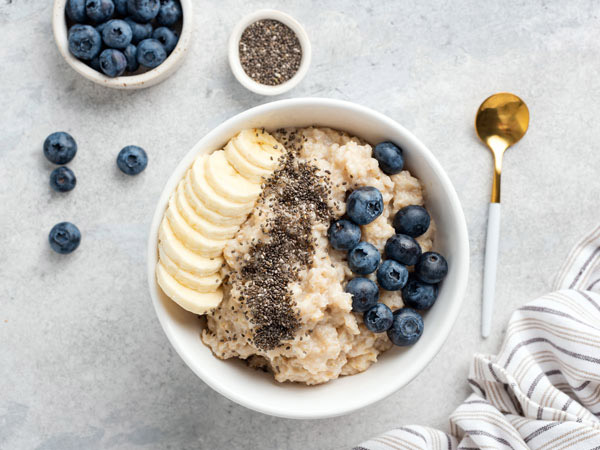
You would think that this wouldn't need to be a question but with pre-packaged ready-to-go cereals on the rise, you just never quite know.
We know that oats are a wonderful thing. Some are more refined that others. Which is actually fine. Some oats are refined more than others yet still come with most of their nutrient credentials intact. They just cook more quickly. Some oats are milled out of all existence, so maybe avoid those.
Porridge is now available as ready to go (already wet) and also as ready to make (dry). Watch out for the ingredients in these, as they may be bulked up with powders, sugars, flavourings, and all manner of extra things.
Then there's the question of what you put in/on your porridge. If you are partial to half a pint of double cream and a few spoons of crunchy demerara sugar as oppose to a spoonful of yoghurt and a handful of berries, then who are we to judge. The good news is that oats are always awesome. The bad news is that it can be easy to offset all the good stuff with a ton of extra calories. Keep nutrient density top of mind and you will be fine. Redefine decadence.
A healthy oat breakfast
Of course, what all of these breakfast cereals have in common is oats. Possibly the most super of all the superfoods, oats really are one of the best things you can eat to support your health and wellbeing.
There is ongoing debate about whether oats contain gluten or not. It is commonly believed that any gluten contamination in oats comes from the processing yet there may be more to it than that. Find out what we discovered in our article 'oats are not gluten-free?'.
What makes oats so great?
Oats are composed of over 10% fibre, most of which is a soluble fibre known as beta-glucan. Digested slowly, this soluble fibre keeps us feeling fuller for longer. Overall, oats are easy to digest, which makes them an ideal food for breakfast.
Beta glucan helps to lower LDL cholesterol levels (the 'bad' cholesterol that you don't want) and helps to prevent blood sugar spikes. Magnesium in oats also helps in regulating insulin secretion.
Oats are a unique source of antioxidant aventhramides which are thought to help prevent heart disease. They also contain a natural sedative called gramine.
Gluten-free cereal
Whether or not you tolerate oats will depend on your individual circumstances, but if you are looking for gluten-free cereal then you do have options. Look for breakfast cereal made from gluten-free grains such as buckwheat or quinoa. These are often puffed and make a delicious addition to granola so you won't feel you are missing out.
Choose low-sugar cereal
We have talked a lot about the good things that go into breakfast cereal, and mentioned (quite a bit) about the bad. But just in case you didn't quite catch the point, here it is again.
Choose low sugar breakfast cereal.
A lot of breakfast cereal, even the so called healthy types and premium options, will come with a higher proportion of sugar (even natural ones) than you would like. Some breakfast cereals contain as much as 40% sugar.
Ideally you want to aim for less than 10% sugar, and at least 3% fibre. Healthy breakfast cereals with no added sugar can still have sufficient sugars from the natural sugar content of their raw ingredients. Nuts and grains etc all contain natural sugars.
How to build a healthy breakfast
With our breakfast formula of 30g wholegrains + 250ml milk/100g yoghurt + 150g fresh fruit + 20g (a small handful) of nuts and seeds, you can't really get it wrong.
We have already thrown in the nuts and seeds for you, so with our muesli and granola aim for a 50g serving.
Here's some examples of how you can switch it up...
Classic crunchy granola, milk and a handful of berries
Yoghurt, gluten-free granola, and a sliced peach
Bircher muesli made with a bircher muesli blend, yoghurt and a grated apple
Smoothie bowl made with yoghurt, frozen berries and low-sugar granola
Porridge made with 5 grain porridge mix, milk, and a sliced banana
Breakfast shake made with rolled oats, milk and a banana
Why not explore our range of healthy cereal and start your day in the best possible way?

